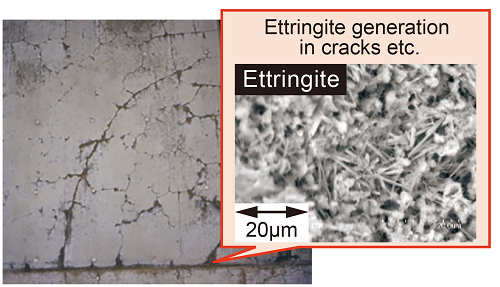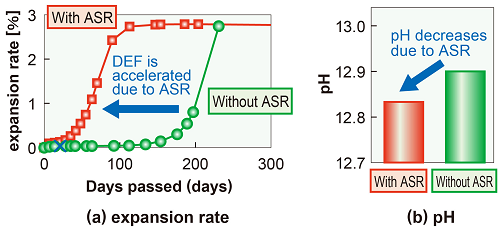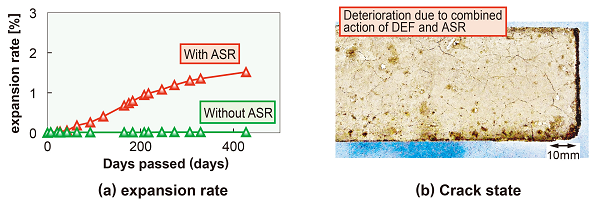30. Factors influencing concrete deterioration due to expansion
Delayed ettringite formation (DEF) is one of the causes of concrete deterioration. DEF occurs when high temperature environments decompose a cement hydrate called ettringite produced inside concrete. This then regenerates over time, leading to expansion cracks in concrete. Previous studies have reported cases of suspected compound deterioration of alkalis-silica reaction and DEF in concrete railway structures (Fig. 1).
However, research conducted on conditions that accelerate DEF has failed to clarify the probability of DEF generation in concrete structures in ordinary environments or demonstrate whether ASR had any influence on the occurrence of DEF.
Consequently, we investigated this influence, and found that decreasing pH in concrete when ASR occurred, created an environment where expansion of concrete due to DEF occurred more easily (Fig. 2).
Similarly, we found that ASR deterioration encouraged DEF expansion even in ordinary environments with a low presence of sulfate and water, causing cracking similar to that of actual concrete structures.
These results indicated that similar cracks could appear due to complex deterioration in concrete structures even in ordinary environments (Fig. 3). DEF occurs in concrete structures with a history of early exposure to high temperatures during construction, which could be accelerated by the decrease in the pH of the concrete.
Thus, we suggested that the influence of DEF should be taken into account during repairs.
Other Contents
- 26. Head car collision testing and numerical simulation
- 27. Snow accretion simulation method for high speed trains
- 28. Ground-to-train communication system using 90 GHz band millimeter-wave
- 29. Mechanisms underlying slope collapse due to rain or during an earthquake resulting from changes in water content of volcanic soil
- 30. Factors influencing concrete deterioration due to expansion
- 26. Head car collision testing and numerical simulation
- 27. Snow accretion simulation method for high speed trains
- 28. Ground-to-train communication system using 90 GHz band millimeter-wave
- 29. Mechanisms underlying slope collapse due to rain or during an earthquake resulting from changes in water content of volcanic soil
- 30. Factors influencing concrete deterioration due to expansion



